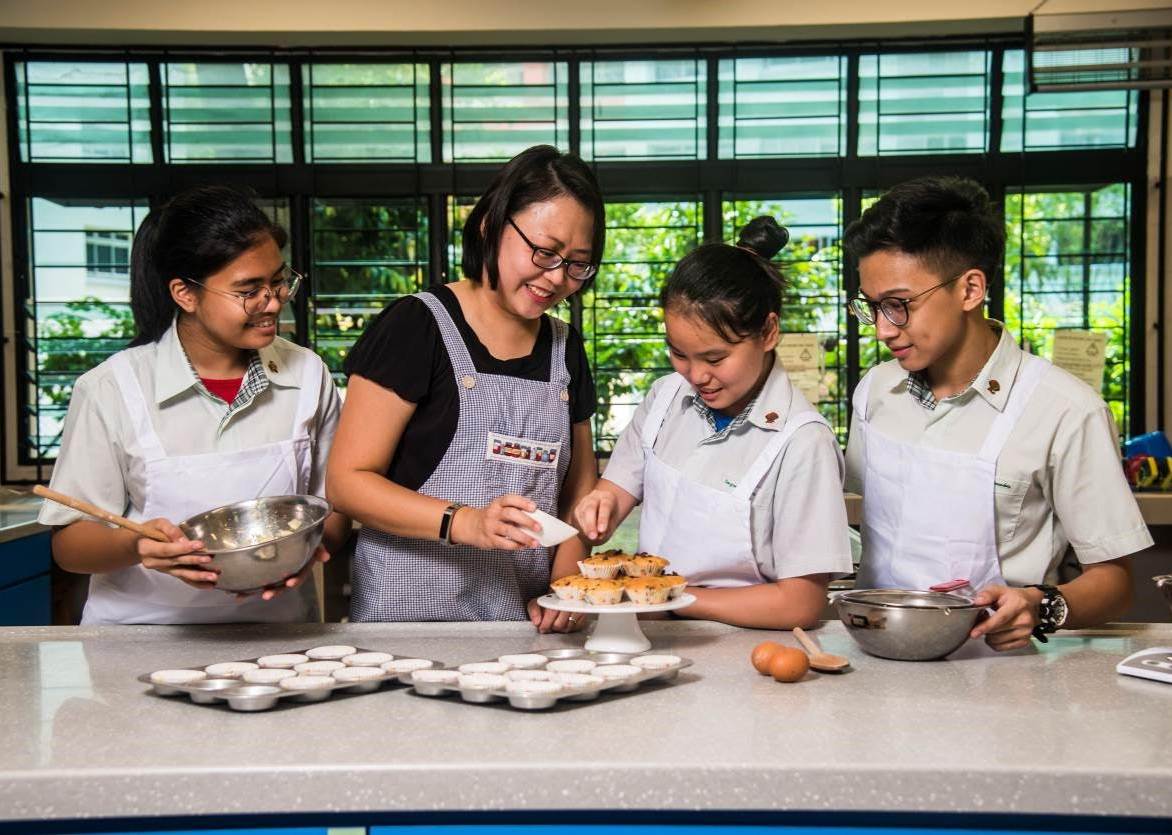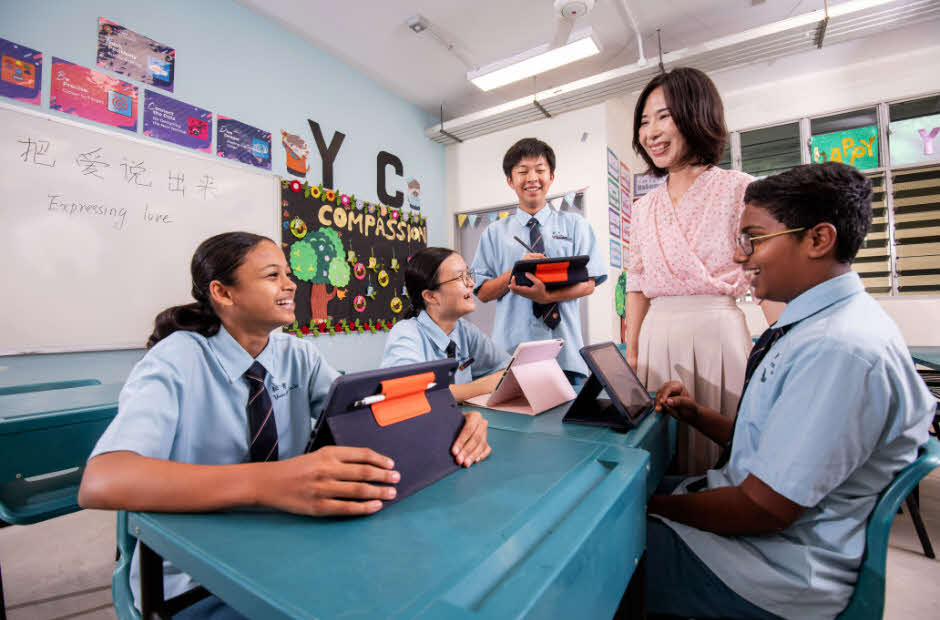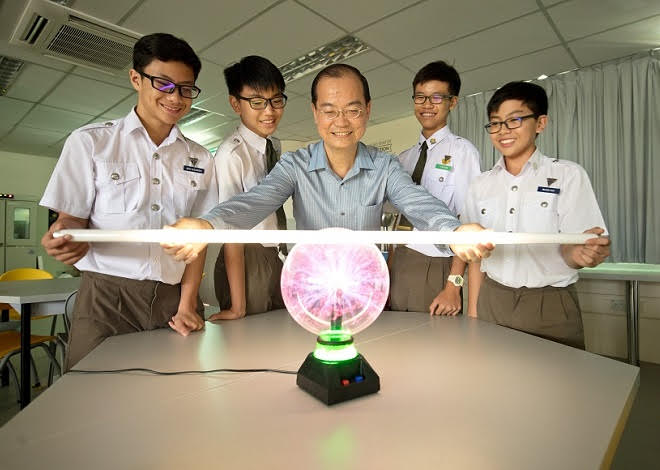Mdm Lee Teck Miang, Evergreen Secondary School, President’s Award for Teachers 2019 Finalist
It’s recess time, and the students of Evergreen Secondary School rush out of their classroom … not to the canteen, but to a learning carnival run by fellow students.
It’s Healthy Eating Week at Evergreen Secondary School, where over five days, 280 student-run booths tackle issues like hidden sugars and salt in food, diet-related diseases and how to modify meals.
Started by Lee Teck Miang, the subject coordinator for Food and Nutrition, the learning carnival is a consolidation of what the Secondary 2 students have learnt over two years in the Food and Consumer Education Programme and an opportunity for them to share their knowledge with the rest of the school.
Students go from booth to booth picking up healthy eating tips through posters, games and quizzes. With each correct answer, they are awarded winning stickers with which they can redeem healthy snacks.
One booth reveals the facts behind the nutritional claims of processed food. At another booth, a poster with the tagline “Are you eating candy?” entices students to learn about hidden sugars.
“The Secondary 2s are very enthusiastic about the carnival,” says Teck Miang. “They
don’t get any grades for this, but they put in a lot of effort.”
Students start preparing about two months in advance, using Google Classroom to
generate ideas and for discussion. One week was also devoted to rehearsals, so students gain confidence in running the stalls and talking about nutrition. Teck Miang
guides the discussions, offers advice, and vets the content produced to ensure
accuracy.
Setting up the ‘a-ha’ moments
“For students to remember, absorb and learn, lessons need to be fun, interesting and
relevant,” says Teck Miang, who uses a variety of techniques to keep her students invested in learning.
For instance, she brings the Secondary 3 Food and Nutrition students to the Cerealtech School of Baking Technology so they can learn how the different kinds of pastries, like cream puffs, fruit tarts and curry puffs are made.
The students hear from professional chefs who use food science to explain how the different pastries are created. They also talk about life in the food and beverage industry. Such experiences help bring to life what the students learn in school and also give them an idea of what a career in the industry would be like.
To keep students interested, Teck Miang likes to overturn their assumptions about food. She asks intriguing questions, like which is healthier — a fish burger or a cheeseburger?
Many students will choose the fish burger because they are conditioned to think that fish is healthier than beef. Teck Miang then points out that the fish fillet has to be deep fried and the batter around the fish soaks up the oil. The beef patty, on the other hand, is grilled and the oil is able to drip off during the cooking.
“The kids are like: ‘I’ve been cheated all my life!’
A similar reaction occurred when a group of students watched a video on rice and noodles and realised there are a lot of sugars in carbohydrates. Students usually think of sugar in terms of sugar granules. Surprised, they set up a quiz for the other students to guess how much sugar such carbs contain.
Teck Miang loves these moments because she wants the students to be surprised. “Kids learn more when they have that ‘a-ha’ moment.”
Let’s discuss
Teck Miang likes to keep her classes focused on discussion to make meaning of information rather than to download information to students. She shares lecture videos that her students watch prior to the class, so they come in prepared to discuss the topics, clarify concepts, and demonstrate their understanding through workbooks.
Teck Miang was the first in her department to use “flipped classroom” as a strategy to
teach Food and Nutrition. Now the entire Secondary 3 and 4 Food and Nutrition
syllabus is taught in this manner.
At her students’ request, she keeps the videos to no longer than six minutes. The Secondary 4s, in particular, appreciate the videos because it allows them to revise easily.
Teck Miang has become an advocate for online learning and even uses it for her CCA.
She is the teacher in charge of the National Police Cadet Corps in Evergreen and to help cadets prepare for promotions, she set up an online learning hub. She collates all the videos sent by headquarters and puts them online in one place so that they are easily accessible.
“We put everything on the website, so students can do self-directed training at home.”
Mind and body wellness
“As a teacher, our role is to educate a child. But our most important role is to keep the
child safe in body and in mind,” says Teck Miang, who is also a teacher counsellor.
This is the thread that links her job teaching food and nutrition to her role as a teacher
counsellor.
When she first joined Evergreen, Teck Miang had gone on a course to qualify her for the teacher-counsellor role. She went on to pursue a part-time degree in counselling from SIM University (now known as the Singapore University of Social Sciences), and graduated in 2011.
“As a Food and Nutrition teacher, and as a counsellor, I want my students to be healthy, both physically and emotionally.”
She was heartened when one student told her that thanks to the Food and Nutrition class, she had developed a better understanding of what kind of diet her mother, newly diagnosed with diabetes, should be on. “She said ‘I’m happy to learn what my mum should and should not eat.’”
This is what makes Teck Miang happy – to help her students see the real-world value of studying food and nutrition and being able to help themselves and others. As she tells her students, “If a machine gets spoiled, you can buy spare parts. But you cannot
buy a spare heart.”






